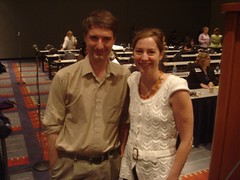GLLS2007: Gaming In Academic Libraries
Lynn Sutton, Giz Womack - Wake Forest University
Lori Critz - Georgia Tech
Sutton:
- most attendees haven't done gaming events {using clicker for audience response. cool!}
- 61% want invisibility as their super power
- wake forest: gaming done for marketing purposes - way to reach out to students
- gaming as complex learning theory - problem solving, media literacy, different paths to success in learning
- want to incorporate into library instruction
- get game @ zsr - name of game nights {zsr is name of library}
- 3 open nights/ one tournament {tournament tires giz out]
- advance registration
- needed: staff (lib staff and resident technology team staff (live in dorms and help students w/ tech)/ equipment/ supplies (food, cords, prize)
- stuff you need aren't insurmountable barriers to success
- had students bring their own consoles - giz was "freaking out!"made plan of what went where in room (immediately "went to heck") {this guy is awesome!}
- marketing - word of mouth (giz likes to talk), have to sell in library as well, student newspaper, gave away candy, made a youtube video
- costs leveled out around $175 per event after initial costs
- audience costs of folks doing it mostly 0-100 bucks
- student surveys: like events, not huge # response but give info, wii was huge hit
- how to keep people to stay after they lose in tournament?
- giz loves the wii
- network guys let them plug into network for xbox live {cool}
- spent her whole $2,000 budget for events
- why? orientation, staff insight into student culture, branding, humanize the library, strengthen ties with IT people
- "unreal tournament" - gory 1st person shooter LAN game, went along with playing it since students wanted
- vendors very willing to give them copies of LAN games in exchange for promo opportunities
- rented GIANT projection screen (don't do this anymore)
- not many females playing {perhaps due to all the killing} - changed way things are done
- out of 100 people playing in tourny, about 8 were left when ended at 2am!
- grand prize= 20 g ipawd
- takes a long time to clean up when over!
- gains? increase coolness, face recognition, lasting goodwill, subtle indoctrination of freshmen to library (signage advertising classes/ databases/ VR help), clubs see library as partner for activities, great image boost for staff
- learned: killing has limited appeal for females and non-gamers, need better tech, way too much staff time!, people like food, need more marketing, expensive!, need volunteer help
- current game night=retro games {coolness!},board games, poker {cool!}, speed dating, ninja tag, DDR - do it during week before school starts to avoid competition w/ frat parties - had 700 freshmen last year



